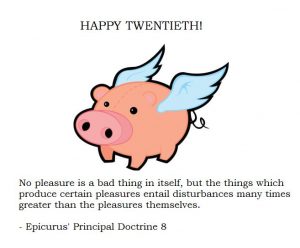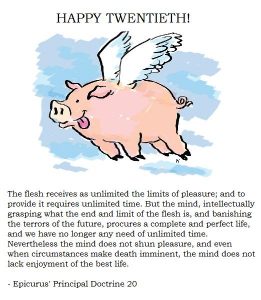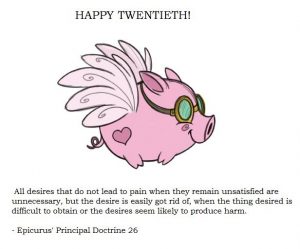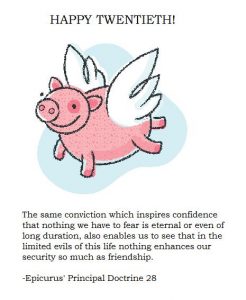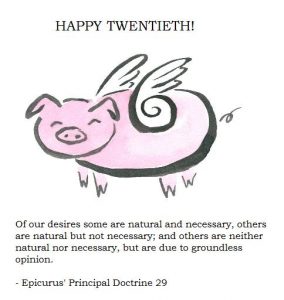Epicurean philosophy is the only secular-humanist missionary philosophy that was born in Hellenistic Greece. It is also, among the old philosophical systems, the one that most continues to be of relevance. The corpus of our wisdom tradition is divided into three parts: Canon (its epistemology, or how to think about nature), Physics (the nature of things), and Ethics (the art of living).
The following is intended as a long-term, self-guided curriculum for people wanting to study Epicurean philosophy on their own and at their own pace. For additional support and resources, we advise students to join the Garden of Epicurus FB group and to raise questions about any of the reading material covered.
Book: Tending the Epicurean Garden
Essay: Six Things I Learned After Writing Tending the Garden
Canon: the Standard of Truth
The ancient Epicureans were reacting against the Skeptics, a school founded by Pyrrho, when they stated that it is possible to have certainty and clear knowledge about nature by means of certain checks and balances–while the Pyrronists believed that certainty was impossible to obtain, and also that it was not desirable. In that sense the atomists were dogmatic: they understood that certainty was possible and desirable.
But if certainty is possible, there must be a standard for firmly establishing something as real. Hence the Canon–the standard of reality and an early precursor to the scientific method, which educates us on the primacy of the senses and of our natural faculties as judges of what is and is not true. This Canon includes: the five senses, the pleasure/aversion faculty, and anticipations.
Book: The Tripod of Truth: An Introduction to the Book That Fell From The Heavens
The Canon has two important effects: first, to establish nature as the standard and ultimate authority, rather than abstractions invented by mortals; second, to help us emancipate ourselves from traditional and arbitrary authorities, which helps explain how women and slaves could be treated as intellectual equals in the ancient Gardens or schools of Epicurus–this kind of equality was very rare in ancient Greece. They did not need priests, mediators, or experts in logic. They believed that each person can independently philosophize and be an arbiter of reality and of their ethical choices by using their nature-given faculties and always basing their views, choices and avoidances on the study of nature.
Physics: The Nature of Things
The philosophy of existence, or in what way things exist, is called ontology. Atomists accept a scientific understanding of the nature of things, and because we accept that things are material, our ontology is Physics, which studies material bodies, and chemistry, which studies the interactions between different bodies. In the writings of Epicurus (as seen in his Epistle to Herodotus), we see that bodies have primary (their own) and secondary (relational) properties.
But modern ideas have ancient roots. Early pre-atomist philosophers speculated non-empirically that everything in the cosmos was made of a primal substance (or several). Some said it was water, other said fire. Anaximander said they were the four known “elements”.
The proto-Platonist Parmenides (515-440 BCE) postulated, again without attempting to reconcile his doctrines with the evidence of nature, that change does not exist, that everything is the same thing (ho Pan, “the whole”), and that our senses deceive us. However, when we see the evidence that nature presents to our faculties, we see the enormous diversity of things (not a single substance that can be called “the whole”), and we also see that there is constant change.
Zeno of Elea was known for his paradoxes, one of which postulated that, if we cut things progressively, we would get smaller and smaller particles to infinity and that this process would never end. This paradox was one of the inspirations for atomism. The word atom means “uncuttable” or “indivisible”.
The first atomists–Leucippus and Democrates–were attempting to prove Parmenides, Zeno, and the others wrong. They tried to reconcile all these cosmological models with the evidence in nature.
Some of the arguments of these early atomists are written in the Epistle to Herodotus. In response to the paradox of Zeno, they thought that if the particles could be cut to infinity, that would mean that all objects would have an infinite number of atoms. And we know that this is not the case because an object with infinite number of atoms would be of infinite size, and that is not what we see. Therefore, there must be a limited amount of atoms in each thing, and therefore there must be a point at which the particles are so small that they are no longer divisible: the a-tom (“in-divisible”).
Then, in considering the error of Parmenides, who denied the existence of change and movement claiming that “the whole” is the same always everywhere, they considered that there had to be empty space (not filled by “the whole”) between the particles because if there was no empty space, there could be no movement and change, which when we observe nature, we see that they obviously exist. Realizing that there must be space between these primordial particles–otherwise there would be no space to move, no sponges could fill with particles of water, nor would we observe things with greater and lesser density and weight–they concluded that in the cosmos, the two primal things must be atoms and void.
Things can either exist or not exist, and to exist is to be made up of atoms. Let’s put it in Shakespearean terms: “To be or not to be”. To be is to exist as particles, and not to be is to exist as void between the particles. Anything that exists, must root its existence in the dynamics between particles and void, or as relational or emergent properties of bodies which, as they increase in size and interact and form systems with each other, gain greater complexity.
Note: We now believe that quarks are the smallest units that make up protons and neutrons. Electrons and photons are not made of quarks but are themselves elementary particles. These and a host of other particles are now considered the irreducible pieces which we may now consider to be what Democritus meant by “atoms.” We must always consider this when translating from Greek, however if we put vocabulary aside, the basics of the classical theory are still valid: it is impossible to divide matter beyond a certain point.
In reading the Epistle to Herodotus we learn that the theories of the ancient atomists and their cosmology model include a fascinating doctrine of innumerable planets, some similar and others different from our own, some without life but others with life both similar and different from the one we see on Earth. This is a function of the infinity of atoms and emptiness in all directions, combined with a limited number of possible combinations of particles according to the laws of nature which are the same everywhere, so necessarily there must be infinite repetitions in every direction of the same phenomena that we see in our part of the cosmos. Ancient atomists speculated often about extraterrestrial life, and the Epicurean comedian Lucian wrote the comedy True Story, which is believed to be the first historical example of the genre of science fiction (although it also falls within the genre of fantasy).
*Essential Book*: Letter to Herodotus. This constitutes “the smaller Epitome” which every beginner in Epicurean philosophy must study before moving on to more advanced material.
The Canon was invented by Nausiphanes, who was a student of Democritus and the teacher of Epicurus. However, Epicurus revolted against the determinist and mechanistic doctrine of his predecessors, as he believed in free will, and this revolt made it possible for Epicurus to become a moral reformer and to add an ethical component to the atomist teaching: a science of happiness and of morality. Epicurus saw that we are not mere robots, that there seems to be a natural impulse that allows for human freedom. He proposed that there must be some element of chaos in the particles, and theorized that there must be a swerve, a movement that happens at random. This element of chaos and chance may translate into what’s known as either Brownian motion, or–more likely–the Heisenberg uncertainty principle, in modern physics.
Ethics: the Art of Living
Blog: Back to the Basics
Ancient Writing: Epistle to Menoeceus
You are probably beginning to see the coherence of the Epicurean system: from the Canon, we get the Physics; and from the Canon and Physics, we get the Ethics. The Epicurean understanding of reality has many practical implications. It implies that it is not wise to fear or appease the gods, who intervene in nothing, since all things follow natural laws. It provides sober therapeutic treatment for the fear of death based on the Physics. More importantly, it implies that we only have one life and, if this insight is taken seriously, it gives us an urgency to make plans and to live pleasantly, to take advantage of the single, non-renewable time we have under the sun. The work of being happy is of supreme importance. The doctrine that says that it is in our nature to seek pleasure and to avoid pain is called hedonism. We inherited this doctrine from the intellectuals of the Libyan city of Cyrene, which has been called by Michel Onfray “a philosophical Atlantis”.
Cyrenaic Reasonings (a summary and commentary on the book by Kurt Lampe titled The Birth of Hedonism)
Herculanean Scroll: Philodemus On Death
Essay: Epicurus’ Four Cures
But what is happiness? What can we know empirically about happiness? And why do the Epicureans insist on establishing pleasure, and not “virtue” (or “happiness”) as the end? For the Epicureans, all Platonization of natural phenomena is a kind of alienation. On the other hand, pain and pleasure are concrete and real, observable in nature, and are perceived and experienced directly by the sentient being. They are not Platonic, but natural and real. The faculty of pleasure and aversion is not an arbitrary dogma of an academic philosopher, but the guidance that nature itself gives us. If we look at newborn babies, or puppies or kitties, we will observe that they shun pain and seek pleasure.
Essays: On Epicurean Virtue and Dialogue on Virtue
The faculty of aversion-pleasure is part of the Canon, so it is understood that through it, nature guides us in our choices and avoidances, as this is the main component of our moral faculty. In establishing pleasure as an end, it is important to understand that it is not a particular activity but a natural faculty, and therefore the definition of a pleasurable life is broad, diverse and individualized. Neither is it a Platonic abstraction, but concrete activities and natural states of mind. The science of happiness has demonstrated that there is something called “hedonic adaptation”: once a person gets used to the pleasure of an activity, she does not enjoy it as much. Failure to understand this phenomenon of adaptation leads to addictions, disenchantment, and other problems. In ancient Epicurean writings, this subject is covered as the need to understand the natural limits of our pleasures and desires. “Pleasant abiding” regardless of our objects of desire, for many, requires training and cultivation of our attention.
That is why Epicurean ethics teaches that we must develop a hedonic regimen, a menu of diverse and varied pleasures, and that we must take on the training to learn to experience constant pleasures, both dynamic and passive. This is done through philosophical practices such as daily cultivation of a spirit of gratitude, frequent association with our wholesome friends, repetition and memorization of teachings, self-reliance projects that protect us from long-term fears and insecurities, Cyrenaic adaptability that helps us to put less faith in our ability to control what happens in the future than in our ability to adapt to it, and other Epicurean practices.
Educational Videos: How to Live a Good Life according to Epicurus; Gregory Sadler “Core Concepts” Series on Friendship, Mental and Bodily Pleasures, on Desires, on Pleasure, Prudence and Justice, on Utility of Justice, and on Pain and Pleasure
On Epicurean Economics – essay
Epicurus and His Philosophy (Minnesota Archive Editions)
A Counter-History of Philosophy
Biography and History: Diogenes Laertius, Chapter 10: Epicurus (Perseus)
Video: A Gigantic Jigsaw Puzzle: The Epicurean Inscription of Diogenes of Oinoanda
Sometimes those of us who learn to love this philosophy acquire a sense of our place within its history. It is impossible to avoid noting that Platonism has been from the beginning the intellectual arch-enemy of our school, and in fact Epicurus and his great friend Hermarchus were expelled from Mytilene by the Platonists. This event is symbolic of the historical opposition between theologians and naturalistic philosophers, between the idealists and the materialists.
Academic philosophy has typically focused on Platonism and Aristotelianism, even though the scientific description of the universe has again and again confirmed the theories of the materialists. That is why modern intellectuals such as Michel Onfray have called for an alternative narrative: a counter-history of philosophy “spoken from the perspective of the friends of Epicurus and enemies of Plato”.
Lucretius in his book On the Nature of Things is a forerunner of this. In his epic poem, he shares anthropology-based origin stories by which he means to dismantle the mythical, non-empirical world-view of his predecessors. Philodemus of Gadara, in his scroll On Frank Criticism, explains that the philosopher must apply two forms of frank criticism (public and private) in order to help improve collective and personal moral character. In the arsenal of rhetorical tools that the Epicureans have historically used for this, we find the use of comedy and suavity.
Another tool we use to honor our own narrative is the monthly celebration of a feast of reason, where delicacies are shared and philosophy is studied the twentieth of every month. This tradition was established by Epicurus in his Final Testament, and is the reason why ancient Epicureans were known as eikadastai (the twentiers, or “the people of the twentieth”).
Book Review: Michel Onfray’s Hedonist Manifesto
Essay: Swinish Herds and Pastafarians: Comedy as an Ideological Weapon
Book: Lucretius’ De Rerum Natura
Book: A Few Days in Athens


